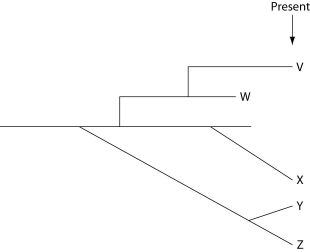Question 31
(Multiple Choice)
The next few questions refer to the following evolutionary tree, whose horizontal axis represents time (present time is on the far right) and whose vertical axis represents morphological change.

-Which conclusion can be drawn from this evolutionary tree?
A) Gradualistic speciation and speciation involving punctuated equilibrium are mutually exclusive concepts; only one of them can occur.
B) Eldredge and Gould would deny that the lineages labeled X, Y, and Z could represent true species.
C) Assuming that the tip of each line represents a species, there are five extant (i.e., not extinct) species resulting from the earliest common ancestor.
D) A single clade (i.e., a group of species that share a common ancestor) can exhibit both gradualism and punctuated equilibrium.
E) V and W shared a common ancestor more recently than any of the other species.
Answer